News
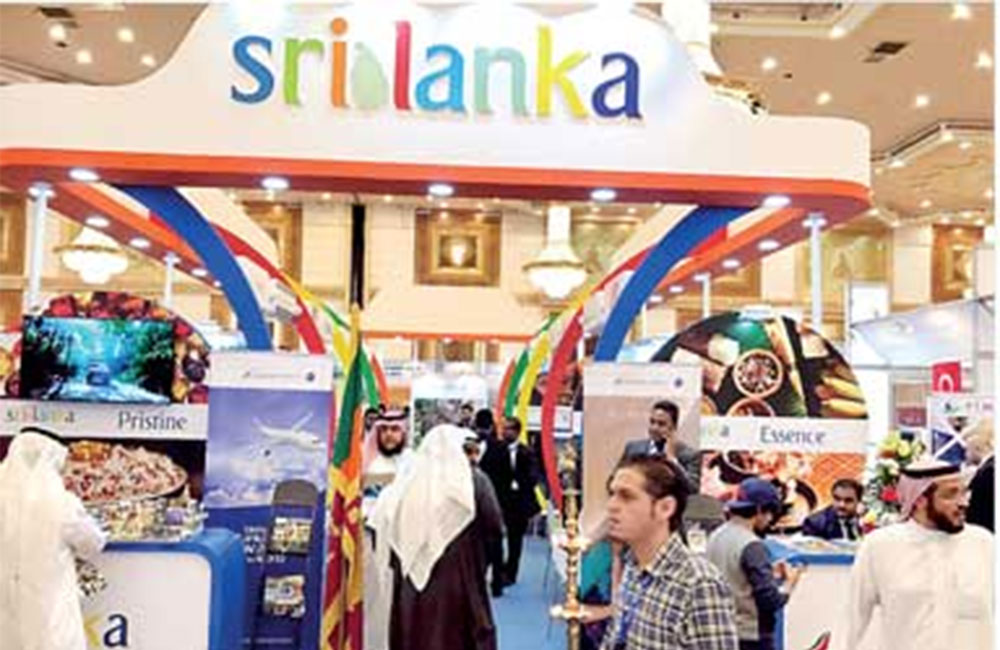
Sri Lanka eyes Jeddah tourist market
Sri Lanka Tourism has embarked on a promotional roadshow in Jeddah, Saudi Arabia, as part of an ongoing effort to boost the number of tourists visiting the island from the GCC.
A delegation of Sri Lanka Tourism officials as well as Sri Lanka’s leading hotels and tourism stakeholders gathered at the Radisson Blu hotel on February 26 to meet with Jeddah's leading travel and tourism companies.
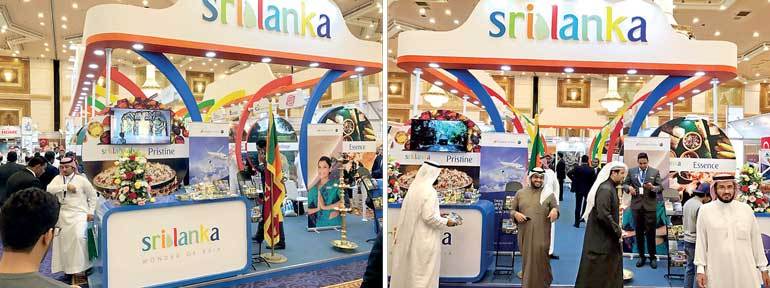
Sri Lanka Tourism showcased its colourful glamour once again at the Jeddah International Travel and Tourism Exhibition (JTTX) which was held from 15-17 February at the convention Centre – Jeddah Hilton, Saudi Arabia.
A total of 14 industry partners from Sri Lanka-based aviation, tourism and hospitality entities joined the roadshow to promote the country’s unique hospitality services and attractions including; Movenpick Hotel Colombo, Centauria Travels, Asian Adventures, Holiday Park, Walkers Tours, Exotic Global Holiday, Lanka Holidays.net and Figco Lanka Holidays, among others. As part of the promotional activities, Jeddah-based travel agents and tourism professionals were provided the latest information and updates on Sri Lanka’s touristic offerings through presentations, workshops and a series of business development meetings.
Madubhani Perera, director of marketing, Sri Lanka Tourism Promotion Bureau, said: "Sri Lanka is one of the preferred destinations for Gulf tourists as we offer a distinctive, adventure-packed, eco-friendly and family-focused experience and offering. With our rich nature, heritage and culture, year-round schedule of festivals and special events, numerous parks and eco centers and luxury resorts and wellness centres, Sri Lanka has many reasons for Saudi Arabian families to return to the island again and again.”
During 2017, Sri Lanka received a total of 35,481 tourists from Saudi Arabia. The island aims to double these numbers and achieve 20 per cet increase from Saudi Arabia by the end of 2018.
Saudi Arabia makes up the largest number of GCC tourists to Sri Lanka, followed by Oman and UAE as second and third largest number of GCC tourists to the island.
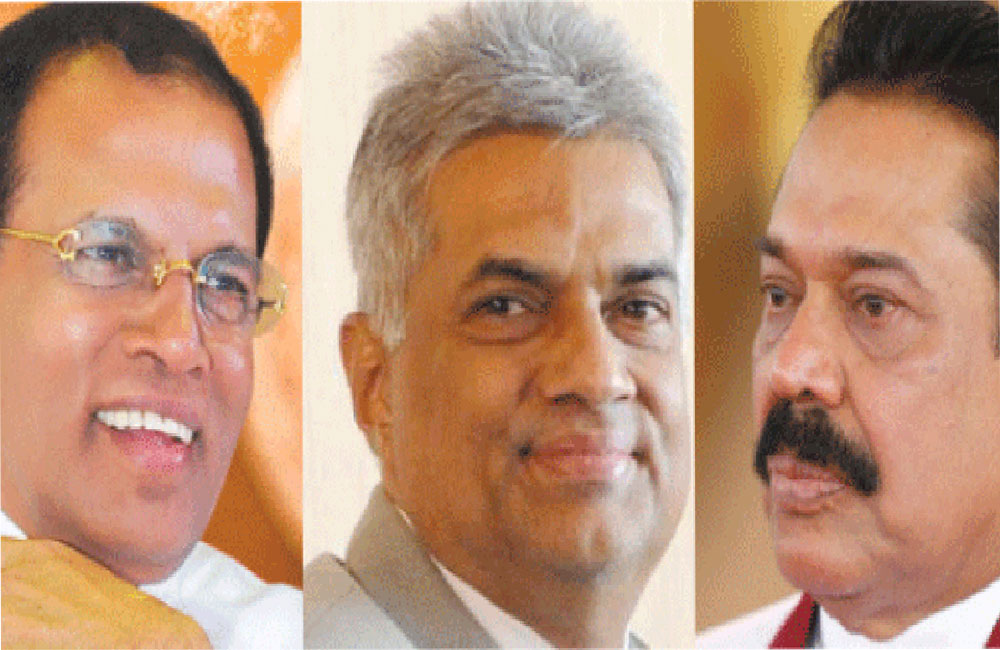
Beasts and monsters: In Sri Lanka, local elections have rattled the government
To critics of Mahinda Rajapaksa, local-council elections that were held in Sri Lanka on February 10th felt like a horror film, as the controversial ex-president rose from his silk-lined political coffin to declare victory. And what a victory it was for Mr Rajapaksa, a brash populist whose exit in 2015 after ten bloodstained and corruption-tainted years in power was widely heralded as a bright new dawn for the civil-war-battered island republic. His party won no fewer than 239 out of 340 contests. Some commentators have described it as the biggest electoral upset in Sri Lankan history. Mr Rajapaksa swiftly declared that the current national government had lost its legitimacy and should resign.
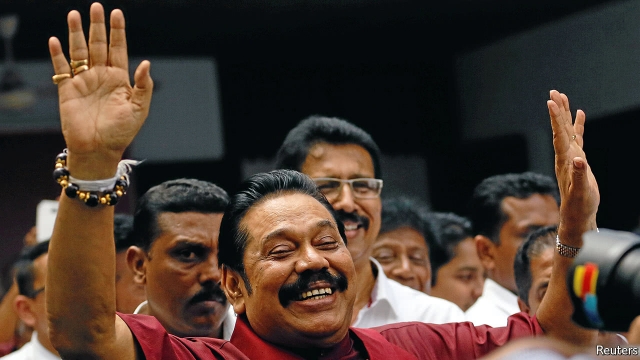
That is unlikely. The coalition headed by the prime minister, Ranil Wickremesinghe, may be ineffectual and unpopular, but it still holds a solid majority in parliament. Elections for the legislature are not due before 2020. Even if Mr Wickremesinghe’s conservative United National Party (UNP) gets jilted by its junior partner, the centrist Sri Lanka Freedom Party (SLFP)—which happens once to have been Mr Rajapaksa’s own party—it could probably hang on as a minority government, reliant on smaller parties that loathe the former president even more than they dislike Mr Wickremesinghe.
Most likely the coalition government will continue to bumble along in clumsy cohabitation with President Maithripala Sirisena, a former minister under Mr Rajapaksa who in 2015 split the SLFP to challenge and narrowly defeat his boss. Fortunately for the prime minister, changes to the constitution that were designed to prevent a repeat of Mr Rajapaksa’s excesses have stripped Sri Lankan presidents of most powers. That means Mr Sirisena has only the wherewithal to obstruct, not to topple, Mr Wickremesinghe’s government.
Humiliating though its electoral drubbing appears, the coalition may take comfort from something else. The council polls were the first to be held under a new system that combines first-past-the-post with proportional representation. Under the old rules Mr Rajapaksa’s new party vehicle, the Sri Lanka Podujana Peramuna (SLPP), could indeed claim to have won a crushing victory even though it got just 44.6% of votes. In practice, under the new rules it will have to find partners to run any council where it has less than 50% of seats. Government supporters are also keen to point out that both in percentage and in total numbers, Mr Rajapaksa got fewer votes to “win” this election than he did in the election in 2015 that he lost to Mr Sirisena.
But the ruling coalition cannot afford to be complacent. Its poor showing, particularly for Mr Sirisena’s SLFP, reflects more than a surprise groundswell of support for Mr Rajapaksa. Many of those who voted to oust the former president in 2015 have been so disappointed by his replacement that this time they did not bother to vote. Critics of the yahapalanaya or “good governance” coalition cite numerous weaknesses, from its failure to enact a promised new constitution and its lack of progress in punishing crimes dating from the civil war of 1983-2009, to its abstinence from economic reforms and its failure to investigate Mr Rajapaksa or his extended family despite widespread allegations of corruption and human-rights abuse.
Still, it may be that the next time Sri Lankans vote, fear of Mr Rajapaksa’s return could prompt even critics of the government to turn against him. “Those who chose not to cast their lot with imperfect beasts have now to contend with monsters,” commented a human-rights lawyer, Gehan Gunatilleke, in a local newspaper.
There are many Sri Lankans who do not regard Mr Rajapaksa as a monster but rather as a hero, particularly among the island’s Buddhist, ethnically Sinhala majority. He was the person who led them to victory in the long civil war with the Tamil minority. They want a strong man like him back at the helm. In fact, says Alan Keenan of the International Crisis Group, a think-tank, the former president never really went away. His grassroots support remained, nurtured by the well-financed family political machine. “He has a strong core constituency, a clear narrative and a good set of issues,” says Mr Keenan, “whereas the government has to pull together a range of minority constituents—Tamils, Muslims, Sinhala liberals—and find something to deliver to each one.”
The prognosis: Sri Lanka is set on a bumpy course. With Mr Rajapaksa gleefully stoking Sinhala chauvinism, the country could slip backwards into the kind of polarisation that led to its long civil war.
This article appeared in the Asia section of the print edition under the headline "Beasts and monsters". (The Economist)
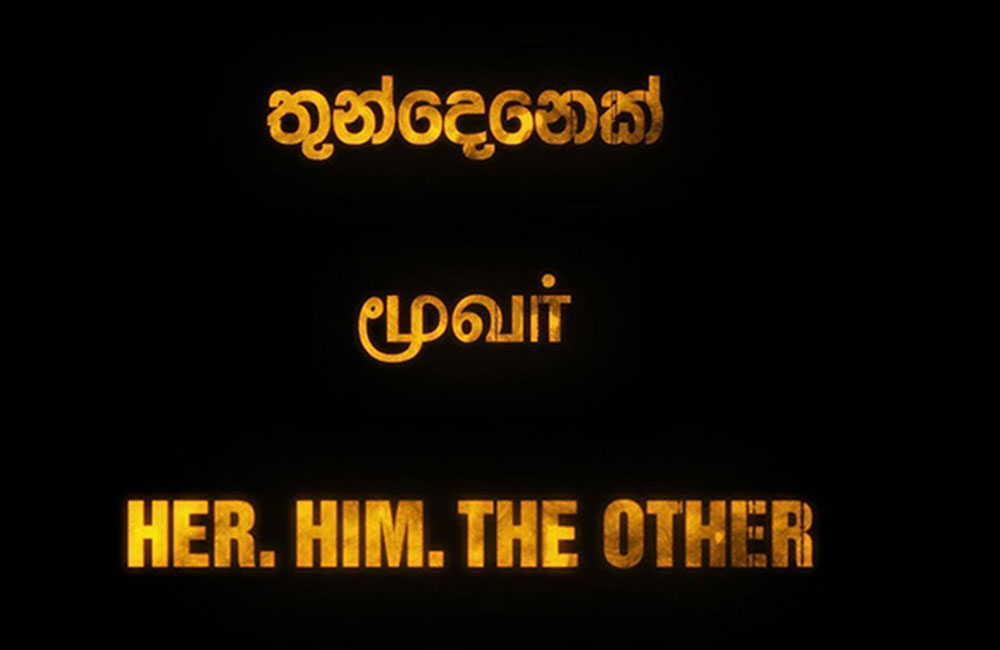
Launch of Reconciliation Policy and the film,'Her. Him. The Other' today
The much-anticipated launch of the ‘National Policy on Reconciliation and Co-existence’, along with the premiere of the film, ‘HER. HIM. THE OTHER’, a production undertaken by the Office for National Unity and Reconciliation, will be held today (27), at the Regal Cinema in Colombo at 5.30 pm.
President Maithripala Sirisena and Prime Minister Ranil Wickremesinghe will also be in attendance.
The National Policy on Reconciliation and Co-existence has been formulated by the Office for National Unity and Reconciliation, under the guidance of former President Chandrika Bandaranaike Kumaratunga.

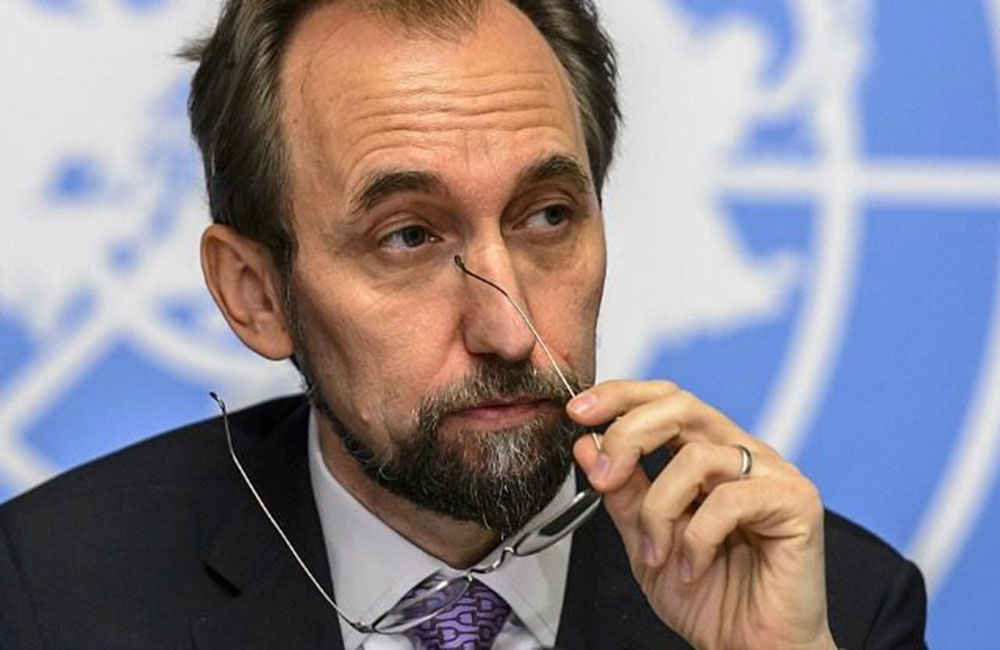
UN rights chief moots Universal Jurisdiction to foster accountability in Sri Lanka
The United Nations High Commissioner for Human Rights Zeid Ra'ad Al Hussein has called on the UN Human Rights Council (UNHRC) to explore other avenues, including the extension of Universal Jurisdiction, to foster accountability in Sri Lanka.
In his report on Sri Lanka to the 37th session of the Human Rights Council, which meets in Geneva from 26 February to 23 March 2018, the High Commissioner reiterates his appreciation for the constructive engagement of the Government of Sri Lanka with the Office of the High Commissioner for Human Rights (OHCHR) and United Nations human rights mechanisms since January 2015.
However, Zeid Ra'ad Al Hussein said that as he noted in March 2017, this constructive collaboration must be accompanied by the implementation of key commitments.
He says the fulfilment of the transitional justice commitments made under Human Rights Council resolution 30/1 has been virtually stalled for more than a year.
Progress with some confidence-building measures has often been insufficient and inconclusive, and the structures set up to coordinate implementation have not consolidated enough or did not receive sufficient political support to move things forward.
In statements and reports issued since 2015, the High Commissioner, while expressing concern over the lack of progress on accountability and reforms, was encouraged by the positive improvement of the general human rights situation.
However, 2017 was marked by intermittent inter-ethnic tensions and attacks on minorities which are unlikely to dissipate completely.
While the Government has managed to steer many of these worrying events in a positive direction, this type of violence in a country that has experienced cycles of extreme violence roughly every 10 years is deeply troubling, particularly when accompanied by hate speech, misinformation and agitation through social media and political manipulation.
The continuing allegations of torture and surveillance and the lack of sufficient progress in implementing critical confidence building measures, such as the release of land, the repeal of the Prevention of Terrorism Act and the solution to the pending cases under the Act, have antagonized key constituencies that could be instrumental to the Government's reform efforts, the High Commissioner's report on Sri Lanka said.
The High Commissioner urges the Human Rights Council to continue to play a critical role in encouraging progress in accountability and reconciliation in Sri Lanka.
He also called on Member States to explore other avenues, including the application of universal jurisdiction, that could foster accountability.
(NewsIn.Asia)
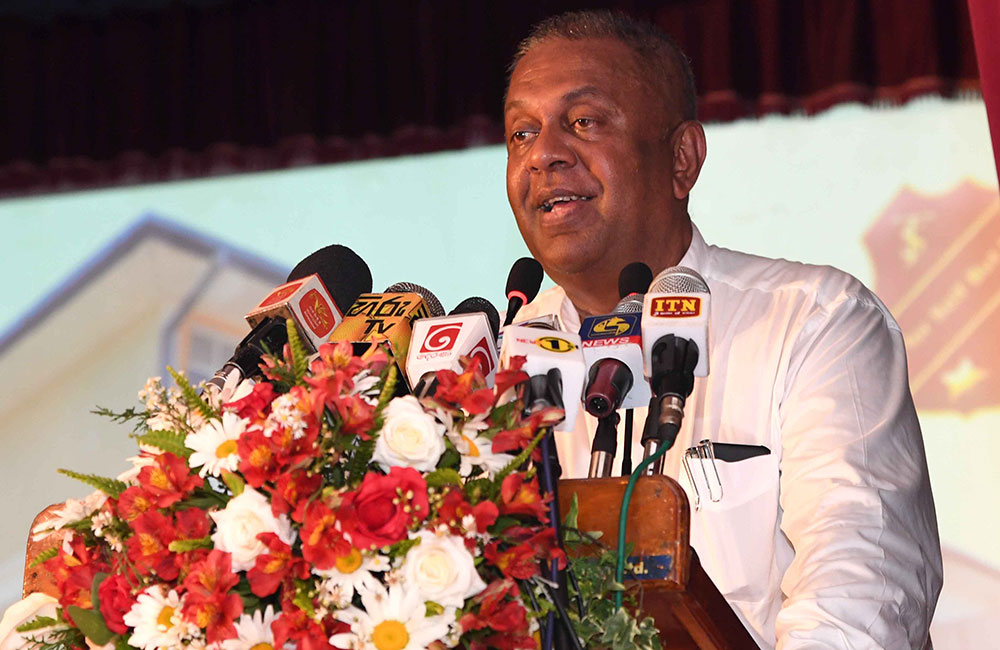
Governments aim is to create youth capable of taking on the modern world : Mangala
The Government's aim is to create a generation of youth capable of taking on the modern world while defeating tribal thinking says Minister of Finance and Media Mangala Samaraweera. The development of a country is ensured by the younger generation continuing to pursue education, he points out.
The minister said that the government is committed to ensuring this. Mangala Samaraweera made this statement at the opening of the school of St. Thomas 'Girls' High School in Matara and the foundation stone laying for a new four storied building.
Speaking further, the Minister said :
‘We've heard of agricultural, industrial, technological revolution. Today it is all about the digital revolution. Our aim is to create a suitable young generation for this. We have an era that talks about artificial intelligence” he said.
In the 2014 budget were allocated for education in the country at just under Rs. 196 billion. We have allocated Rs. 333 billion for education from the 2018 budget. The Minister said this shows the governments dedication to education.
The Minister also voiced his opinion on an incident that had taken place on the day. “When I arrived here today a student who I believe is a prefect handed me a sheaf of betel and worshipped me” he said adding that this should not be done. No one should bend before power, the Minister said. According to him, people should only worship their religious leaders, parents and teachers. “That is enough” he said adding that people have not got used to worshipping various politicians.
:Who knows what illegal things I do back at home so only worship those who should be worshipped” he said. “We must create a society that is able to work with a backbone” he said.
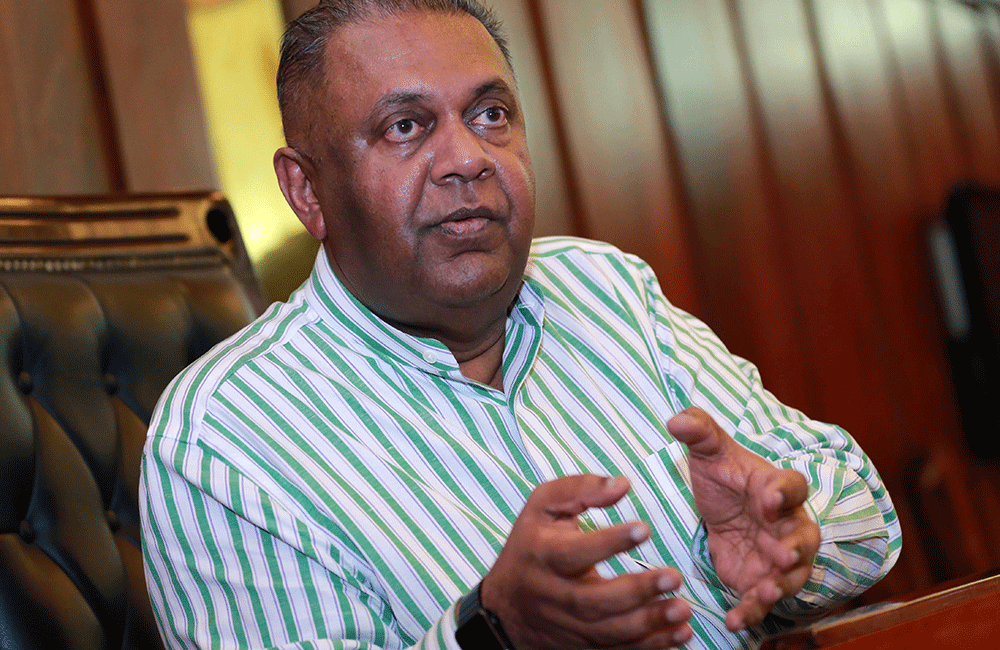
G-24 countries’ Technical Group Meeting to be inaugurated by Finance Minister tomorrow
The two-day Technical Group Meeting of the G- 24 countries will be held tomorrow at the Bandaranaike Memorial International Conference Hall.
Over 45 delegates consisting of Secretaries of Ministry of Finance and the Governors of the Central Bank or their representatives at a very senior level from the member countries will participate at this two-day technical committee meeting. The Group of 24 (G24), a chapter of the Group of G-77 countries, was established in 1971 to coordinate the positions of developing countries on international monetary and development finance issues and to ensure that their interests were adequately represented in negotiations on international monetary matters.
The G – 24 group, which is officially called the Intergovernmental Group of Twenty-Four on International Monetary Affairs and Development, receives the secretariat services from the IMF. Its meetings usually take place twice a year, prior to the International Monetary and Financial Committee and Development Committee meetings, to enable developing country members to discuss agenda items beforehand.
The G-24 Bureau is the executive arm of the G-24 and consists of the Chair, First Vice-Chair, Second Vice-Chair, and two previous Chairs. Currently, the Bureau is headed by Minister of Finance and Media Mangala Samaraweera.
The G-24 Technical Group Meeting (TGM) serves as the main forum for discussing the key work program priorities of the Group and preparing for the plenary meetings of Ministers and Deputies. The TGM is also a forum for peer learning, and sessions include discussions of the country and regional experiences.
The 2018 TGM covers as its first theme debt management and sustainability. In this regard, the discussions will focus on key debt management and sustainability challenges faced, and strategies used, by policymakers, both in terms of addressing macroeconomic linkages and improving liability management. The second and related theme will be mobilizing external sources of capital in light of current, tightening global and market conditions.
This will involve sessions on the role of trade and investment agreements in boosting investment opportunities and the challenge of managing capital flow volatility, with a special session on the potential role of SDRs in improving the international monetary system. The discussions in the TGM will focus on the challenges faced by policymakers in these areas and the multilateral actions necessary to support domestic policy efforts.
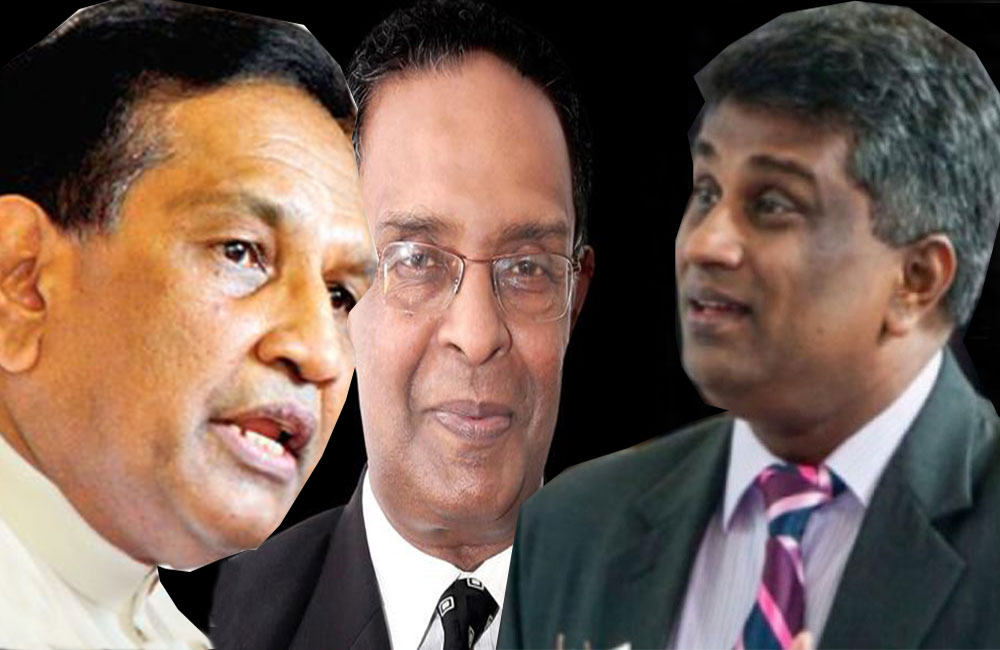
PM appoints committee to fast track measures against corruption
A committee comprising ministers Dr. Rajitha Senaratne, D.M. Swaminathan and Ajith P. Perera was appointed to expedite measures against corruption and fraud, the Prime Ministers Office said. The secretary to the Ministry of Law and Order will function as the secretary to the committee.
Meanwhile, Co-cabinet spokesman Dr. Rajitha Senaratne said that the prime minister only took over the Ministry of Law and Order for two weeks and that Minister Sarath Fonseka will be appointed to that position, despite the objection of some senior police officers.
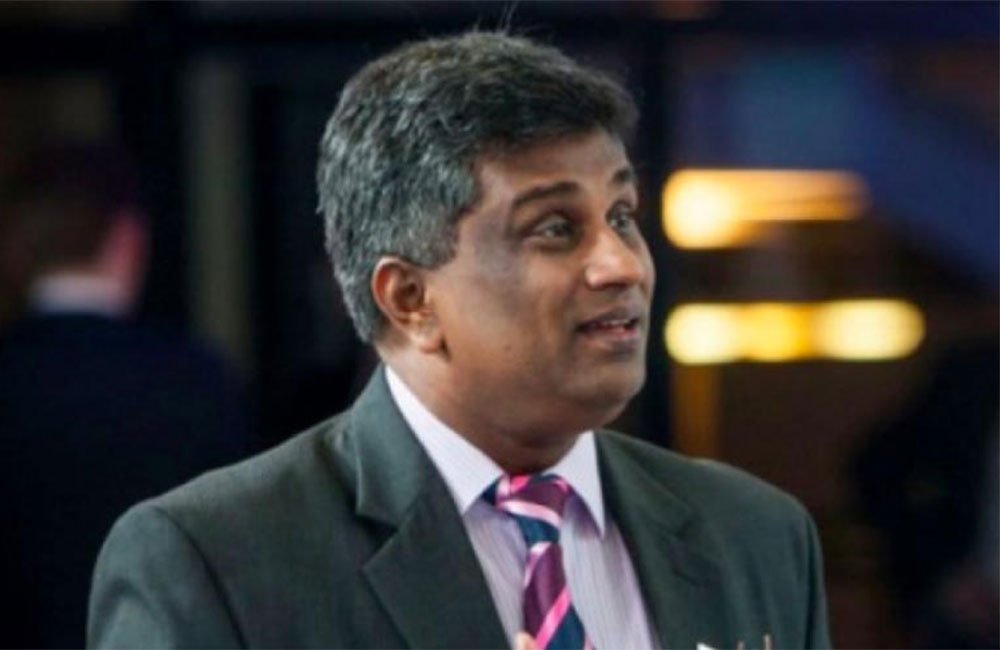
Reshuffled cabinet to be revised in less than 24 hours: Ajith P. Perera wins the Ministerial battle
Ajith P. Perera who was sworn in as the Minister of State Minister of Prison Reforms, Rehabilitation and Drug Prevention during yesterday's cabinet reshuffle is said to have met Prime Minister Ranil Wickramasinghe to express his displeasure regarding the ministerial portfolio presented to him.
According to political sources, Minister Ajith P. Perera had visited Temple Trees to convey his displeasure to the Prime Minister and claimed he would resign if a change in the ministerial portfolio is not done within the next 24 hours.
Prior to the Cabinet reshuffle, Perera served as Deputy Minister of Power and Energy and Renewable Energy. Political sources say he has now requested for the same ministerial portfolio he previously held.
However, after a lengthy discussion is it said that parties had agreed to appoint Perera as the State Minister of Power and Energy.
Meanwhile, sources at the Presidential Secretariat say that another swearing-in ceremony will be held today to revise certain positions of the cabinet reshuffle held yesterday (25) based on the demand of the UNP leadership.
Accordingly, political sources confirm that Ajith P. Perera will be sworn in as the State Minister of power and renewable energy today (26).

Traces of alcohol found in Sridevi’s body, died of accidental drowning
Dubai Police said today that the initial investigation shows that Bollywood actress Sridevi drowned in the bathtub of her hotel room.
They found traces of alcohol in her body and this may have led to the accident.
“The investigation is still going on to determine the circumstances surrounding the accident as the forensic report only says that she drowned,” an official told Gulf News.
The police are trying to piece together the sequence of events and find out who was with her when the incident happened.
(Gulf News)
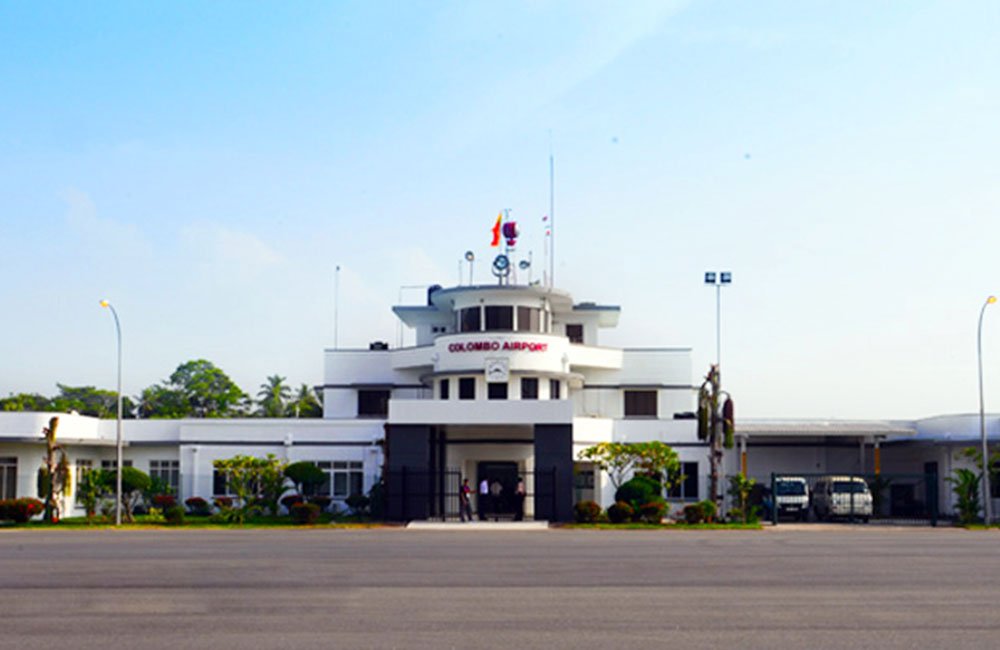
Ratmalana airport poised for major take off
A master plan for Sri Lanka’s Colombo Airport Ratmalana developed and approved by Cabinet last week has envisioned the positioning of the airport as the ‘Exclusive Gateway to Colombo, Sri Lanka’ by year 2030, the Sunday Observer learns.
According to the plan which lays out a comprehensive implementation program to achieve this goal, capacities and capabilities at the airport are to be developed under five key strategic areas, namely, corporate jet operations, domestic aviation hub, regional aviation training hub, regional airport operations and Fixed Base Operations (FBOs) and Maintenance, Repair and Overhaul (MRO) investments.
“The Airport has great potential to attract the niche market of corporate jet traffic and cater to the exclusive passenger profile it serves. Further, significant interest has been shown by foreign investors to establish aviation related operational bases for FBOs and MRO operations at the Airport,” Executive Director, Airport and Aviation Services Ltd (AASL), Johann Jayaratne said. According to informed sources, 136 international corporate jet movements were entertained at the airport last year showcasing its potential as the international gateway for corporate jets carrying high profile tourists, businessmen, and other high net worth individuals.
“We are particularly looking for a world class corporate jet FBO to establish itself at the Airport, thereby, adding considerable value to this niche market,” he said.
Meanwhile, Jayaratne pointed out that the Colombo Port City development will benefit greatly by the Ratmalana Airport’s advancement by facilitating corporate jets, as this will holistically blend with the domestic aviation hub located at the airport.
“The close proximity of the Airport to the Port City and access to any part of the country through the domestic aviation network are all pluses to the international businessmen visiting the Port City,” the AASL Executive Director highlighted, noting that the combination of international corporate jet operations linked to the domestic aviation network further strengthens the tourism industry.
Jayaratne outlined that in addition to the corporate jet operation, there is also a growing demand by new domestic airline operators to establish themselves at the Airport. According to him, some of these operators will be, establishing training facilities for Pilots and Aeronautical Engineers.
Colombo Airport Ratmalana is the domestic aviation hub in Sri Lanka facilitating all 15 registered domestic airlines in the country. The Airport also provides hangar facilities to 10 operators and handles approximately 70 aircraft movements per day.
Source : Sunday Observer

One missing after vehicle plunges into Vienna Canal
An individual is reportedly missing after a vehicle plying from Bandarawela to Mahiyanganaya plunged off the road and into the Vienna canal in Mahiyangana, this morning.
Four individuals including the driver and a woman have escaped the tragedy. The woman who escaped was admitted to the Mahiyangana Hospital due to minor injuries.
Mahiyangana Police is conducting a search for the missing individual. The area is known to be accident prone Police said.
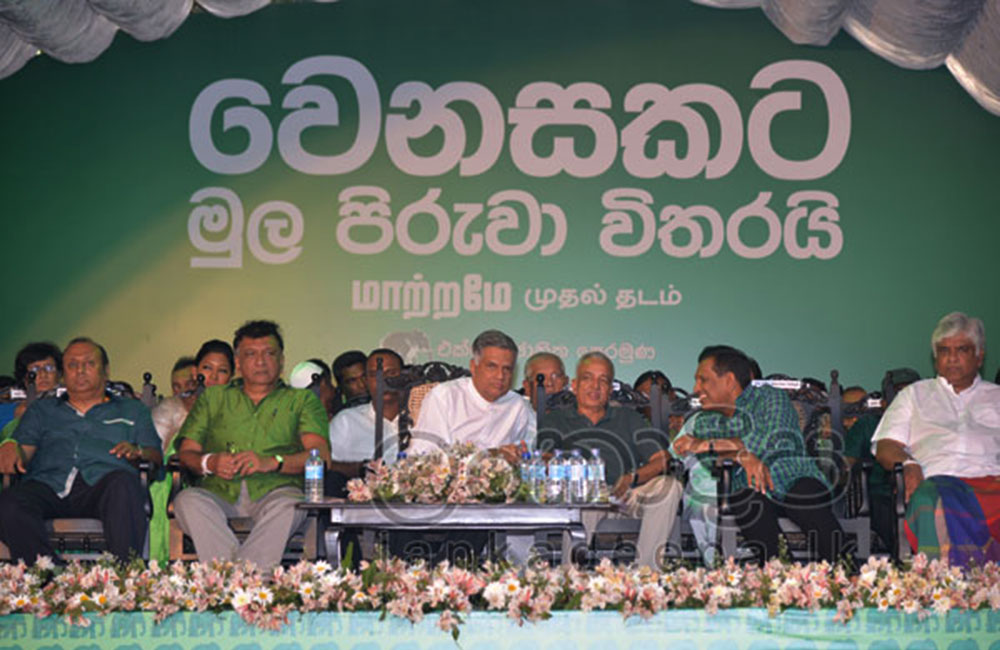
Change lands RW in trouble: Dissent raises its head in the UNP yet again
Some United National Party (UNP) Ministers today slammed the cabinet reshuffle of UNP Ministers saying it was a joke.
State Minister Vasantha Senanayake said that the swap of some cabinet portfolios held by UNP Ministers was the first part of a television comedy episode.
Senanayake said that the second part of the episode will be seen soon.
The State Minister said that he was not sure if the public will cry, laugh or throw stones at what took place today. He said that the public expected real change in the cabinet reshuffle and that was not seen today.
Deputy Minister Ranjan Ramanayake said that some UNP members were not happy with the portfolios they received. Ranjan Ramanayake said that he would have been happy with a better Ministry post yet he has had to continue as the Deputy Minister of Social Empowerment and Welfare.
He also said that Ajith P Perera, who was appointed State Minister of Prison Reforms, Rehabilitation and Drug Prevention did not seem happy.
Source : Colombo Gazette
Page 468 of 510